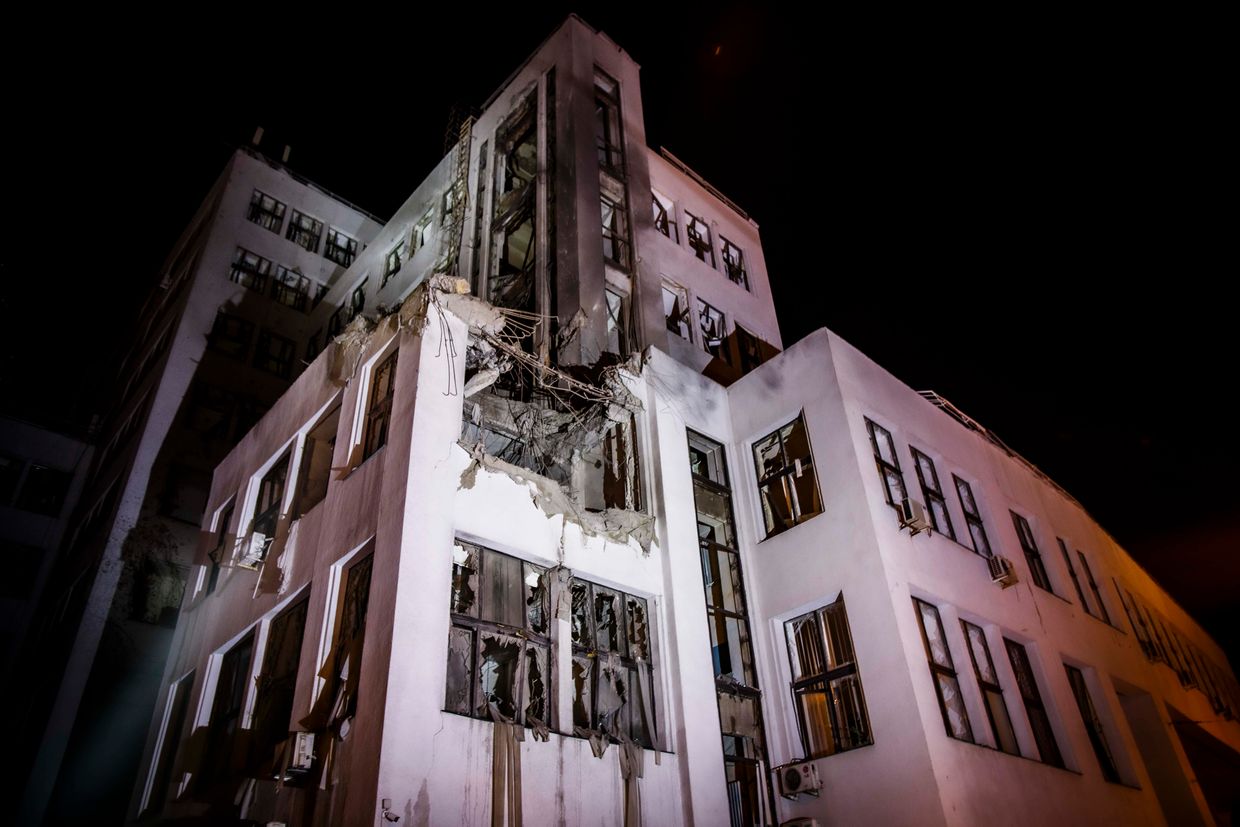He/Him
Sneaking all around the fediverse.
Also at breakfastmtm@fedia.social breakfastmtn@pixelfed.social
- 267 Posts
- 86 Comments

 7·6 days ago
7·6 days agoI just meant that there are around 500 confirmed cases. There are probably many that have yet to be confirmed and others where it’ll never be possible to confirm. So ~500 is the floor not the ceiling.

 9·6 days ago
9·6 days agoI read that more as “at least 500.”

 71·10 days ago
71·10 days agoI’m not sure that the headline is saying that it’s not normal to be freaked out – just that people are freaked out.

 20·10 days ago
20·10 days agoBoth sides taking the off-ramp, returning to the shadow war, and not attacking each other directly.

 8·10 days ago
8·10 days ago999 problems and federation is probably one

 3·10 days ago
3·10 days agoWeird. Why are the powers that be hiding 3 posts from you???

 101·10 days ago
101·10 days agoWhoa, this was my 1000th post. Huzzah! (or Sorry!)

 82·11 days ago
82·11 days agoAt least for now, it looks like Iran is downplaying the attacks, which is a good sign for de-escalation.

 32·12 days ago
32·12 days agoUnprecedented? Maybe? But unexpected? You’d have to have been deluded to think Iran was just going to take it.
You’ve sort of set that up as either that reaction or no reaction. Everyone expected a reaction. Iran and Israel have been at this a long time. Israel expected a reaction similar to their past actions. And they’ve always avoided direct confrontation. I don’t think I saw anyone predicting that response from Iran before it happened.
No it definitely was. The first attack from Iran from a few months back was done pretty politely.
I’m just skeptical of that. I think their second attack was similar to the first but with less lead time and better weaponry – an amped up version of their initial message which was basically, “don’t fuck with us.”
The main reason I’m skeptical is that I don’t think Iran wants war right now. They had even initially said that Hezbollah was going to responsible for the response. That led to internal debate that was won by more hard line voices. But this really couldn’t be a worse time for war for Iran. They’re probably weaker right now than they’ve ever been. Their economy is terrible and the public hates the government. Their unpopularity led to civil unrest that they violently suppressed, which restored order but increased public dislike of the government. The domestic picture is not rosy right now.
On top of that, their game plan in conflict is to be backed up by their proxies, primarily Hezbollah. That plan is in tatters now. Hamas has probably lost about 75% of their fighters. They’re in no position to be a major threat at the moment. Hezbollah has been weakened and is relatively disorganized compared to a few months ago. They had near absolute trust in Nasrallah and they probably can’t be certain that whoever replaces him will share his level of commitment. The Houthis are further away and are the least reliable of the three. Finally, Iran doesn’t have to lose to lose. Any diminishment of Iran is a relative strengthening of Saudi Arabia that shifts the balance of power in the region.
All of that taken together leads me to think their intention was to put an exclamation mark on their previous message and not dare Israel to go to war with them.

 133·12 days ago
133·12 days agoIran’s response was literally unprecedented. No one could have reasonably expected them to react that way based on their past behaviour.
The point though, is that Israel miscalculated. They saw that attack as similar to past actions they’d taken. They didn’t see it as an escalation and, most importantly, they didn’t think Iran would see it that way. They were extremely wrong. Similarly, though based on much less information, I suspect that Iran’s most recent attack wasn’t intended as a massive escalation but as coming right up to the line without crossing it. More saying “we are deadly fucking serious.” It wasn’t taken that way.
The larger point is that two sides that don’t talk to each other making estimates of reactions to violent responses is dangerous as fuck.

 3·13 days ago
3·13 days agoWiki:
The Maeil Business Newspaper (Korean: 매일경제신문), also simply known as Maekyung (derived from the pronunciation of the Korean name) or MK, is a comprehensive daily newspaper published in South Korea, first issued on March 24, 1966. The president of the publishing company is Chang Dae-whan.
. . .
Maeil Business Newspapers are generally moderate media, but many say they are close to pro-business conservatism.

 12·13 days ago
12·13 days agoAccording to coverage from ABC, there weren’t any:
Mexican army troops have killed 19 suspected drug cartel gunmen in a shootout and suffered no casualties, the Defense Department said.

 5·18 days ago
5·18 days agoIt’s complicated:
Threats against journalists and their sources have increased exponentially since the latest round of factional fighting broke out after two Sinaloa drug capos — one from each faction — flew to the United States and were arrested there.
. . .
Journalists have reported being stopped by gunmen on roadways outside Culiacan and told they couldn’t cover the continuing gunbattles happening on the outskirts of the city on an almost daily basis.
The fear is well founded; in 2022, one of El Debate’s columnists, Luis Enrique Ramírez, was abducted and killed in Culiacan. His beaten body was found wrapped in plastic on a dirt road outside the city.

 87·18 days ago
87·18 days agoIsrael, the US, and probably others were looking for him but no one could find him. It was a chance encounter with trainee soldiers.

 81·19 days ago
81·19 days ago“This is an alternative frontend to Reuters. It is intented to be lightweight, fast and was heavily inspired by Nitter.”
I agree that we should just link to Reuters and include neuters in the post body, like most do with archive.today links.
Edit: I checked and it’s unchanged from the original. They don’t actually link to the original, which is super annoying, but you can get to it by replacing ‘neuters.de’ with ‘reuters.com.’

 31·19 days ago
31·19 days agoReuters MBFC.

 14·24 days ago
14·24 days agoNo, if there were serious, pervasive bias impacting scores, it would lower the correlation and MBFC would be an outlier in the group because they would be in agreement less. If something’s happening at such a low level that it doesn’t impact correlation, it’s just an outlier. Multiple researchers conclude that the differences between monitors is too low to impact downstream analysis which is hard to square with your claim. And, each entry represents about 0.01% of their content, so what percentage of that data is being used to draw sweeping conclusions about the whole?
There is just high agreement about what constitutes high and low quality news sites. The notion that MBFC is somehow inferior to other bias monitors or extremely biased is not supported by evidence. If one of those organizations is better than the others, it isn’t much better. As this study concludes, because the level of agreement between them is so high, it doesn’t really matter which one you use. They’re all fine. Even they think so. Not only do MBFC ratings correlate nearly perfectly with Newsguard, Newsguard’s rating of MBFC is a perfect score. They’re well-respected by each other.
And, really, how could these researchers who’ve dedicated their lives to understanding this stuff have gotten it so wrong? Academia definitely isn’t a hotbed of conservatism. Using awful tools could destroy their careers but MBFC is regularly used in research. Why? How are these studies getting through peer-review? How are they getting published? There are just too many failure points required.

 1317·24 days ago
1317·24 days agoFrom the JPost article:
Two articles published in the last few days were part of the IDF investigation, one from Jewish Chronicle and one from the German tabloid newspaper Bild. Both have claimed to reveal internal and top secret documents of Hamas, supposedly straight from Yahya Sinwar’s computer.
Not the NYT. Not sure how the Times gets painted with that brush for not publishing based on those documents. Damned if you do, damned if you don’t, I guess.
Your claim about the sexual violence article is also not true. The NYT spent a month re-reporting that story which didn’t result in a single correction. Their reporting is also supported by a UN investigation that concluded that there “are reasonable grounds to believe that conflict-related sexual violence — including rape and gang-rape — occurred across multiple locations of Israel and the Gaza periphery during the attacks on 7 October 2023.” I don’t think you can accuse the UN of collaborating with the IDF.
From this article:
The Times assessed the documents’ authenticity by sharing some of their contents with members of and experts close to Hamas. Salah al-Din al-Awawdeh, a Hamas member and a former fighter in its military wing who is now an analyst based in Istanbul, said that he was familiar with some of the details described in the documents and that keeping organized notes was consistent with the group’s general practices. A Palestinian analyst with knowledge of Hamas’s inner workings, who spoke on the condition of anonymity to discuss sensitive topics, also confirmed certain details as well as general structural operations of Hamas that aligned with the documents.
The Israeli military, in a separate internal report obtained by The Times, concluded the documents were real and represented another failure by intelligence officials to prevent the Oct. 7 attack. The Times also researched details mentioned in the meeting records to check that they corresponded with actual events.


















Ukrainian losses in the east are well documented. From another article today in the Kyiv Independent:
~~
There aren’t official public Ukrainian stats on this. There are various estimates. The US estimates about 70K. An anonymous Ukrainian official told the WSJ it was 80K last month. I can’t tell where their 57K comes from, but it’s a bit lower than most estimates. It’s definitely not an outlandish number though.
I’m assuming your 31K is from a public statement from Zelensky in February. Here’s another Kyiv Independent article that examines that public statement about casualties – and the difficulty of getting accurate information. Even in March they said that estimate was “significantly lower than some recent estimates published by sources outside the government in the absence of official data.” And that was more than 8 months ago.